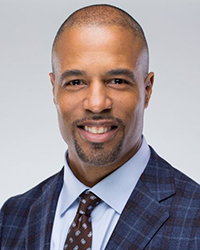CALL TO ACTION
Show your community the impact of professional learning
By Frederick Brown
Categories: Advocacy/policy, Data, Evaluation & impact, Standards for Professional LearningFebruary 2024
When I was a child, it never occurred to me that my teachers and principal were still learning. I just assumed they knew everything they would ever need to know. And even though Mom and Dad were very involved in my education, I suspect it never occurred to them, either, that my school’s esteemed staff would need to engage in continued growth and development.
My perspective changed when I became a teacher and then a principal. Everything I did was in service to students, including a commitment to growth and improvement. Students and their parents were more than just my customers — they were my purpose. And I owed it to them to learn everything I could to meet their needs.

Now I have language for this, in the form of the Professional Expertise standard of Learning Forward’s Standards for Professional Learning. It reminds us that educators need to “continually build their discipline-specific expertise to understand the conceptual foundations that undergird their roles and responsibilities” (Learning Forward, 2022). As an elementary teacher, that meant staying abreast of evidence-based strategies to meet the academic needs of each and every one of my students. As a principal, it meant continuing to build my own leadership skills to strengthen the conditions in my school for optimal learning and teaching. And as CEO of Learning Forward, it includes building a professional learning community with other association and field leaders to continually strengthen my professional learning and leadership skill sets.
But this kind of learning is still not transparent to most students and parents. If I were a student today, I would probably make the same assumptions I did when I was a child. It’s time to change that pattern. And one of the strategies we need to do so is the focus of this issue of The Learning Professional: evaluation. In this issue, you’ll hear from several authors about why it’s important to document and share evidence that professional learning is making a difference for students. I’ll add two of my own reasons: modeling the importance of learning for your community and demonstrating impact to policymakers.
SHARE THE RESULTS OF YOUR LEARNING WITH YOUR COMMUNITY
Although I quickly learned the value of professional learning, it took me time to realize the importance of sharing that message with students and parents to model learning as a priority for everyone. As a teacher, I remember going to my first National Council of Teachers of Mathematics conference. I came back with so many new strategies and ideas to try with my students. It didn’t take long for them to see the fruits of my learning, but I never made that connection for them. I never took time to say, “This new strategy is something I learned at the conference.” As I look back, I realize those were missed opportunities.
As a principal, I got better at sharing my learning with students and parents. I remember taking a group of teachers, a parent, and a student to the Coalition of Essential Schools conference. I invited the parent, who was a member of our parent-teacher organization, because I wanted her to see what we were learning and communicate it to fellow parents. I invited the student to present the work of my principal’s advisory council, a group of students who helped me as a principal think creatively about teaching and learning in my school, and to encourage him to communicate to his classmates how his teachers and principal were learning to improve their practice.
Over time, I have learned that sharing our learning journeys with students and parents is important, but it’s not enough. They also deserve to know the impact of our professional learning. Evaluation allows us to document and share the changes we are making that benefit students. That kind of transparency builds trust, which is an essential component of school leadership and high-quality teaching. It also helps parents understand why we take time for learning and helps them become supporters and allies of professional learning, even when it means changes to their students’ schedules.
As a field, we know a great deal about how to effectively measure the impact of professional learning. Yet we often miss opportunities to use those methods and invest the time and effort necessary. To change that pattern, we need to take consistent and concrete steps to make evaluation a priority and share the results. Here are a few suggestions to get you started:
- Have a strategy for showing the short, intermediate, and long-term outcomes of your learning. For many, the creation of a logic model can be a helpful tool in documenting that journey. Learn more about logic models and many other useful tools on p. 58 and throughout this issue of the journal.
- Create a culture where outcomes are transparent and accessible to parents and students. For students, it can be as simple as saying, “I learned these new strategies as part of my professional learning. Now you get to benefit from that learning.” For parents, you might share data showing aggregated student improvements that can be tied to teacher practice informed by the professional learning experience.
- When the data give you reasons to celebrate, do it! Share in the parent newsletter, on the marquee outside the building, or during events.
MAKE THE CASE TO POLICYMAKERS
There is another important reason to conduct and share the results of evaluation: the dollars to support professional learning may disappear if we can’t make valid arguments for their continuation. At this very moment, there is a political debate about funding to support professional learning. In recent months, you’ve heard Learning Forward describe how the early budget negotiations in the U.S. House of Representatives effectively zero out Title IIA, the funds many districts count on to support their professional learning efforts. These dollars pay for instructional coaches and other positions, teachers’ and leaders’ opportunities to attend external learning events, and more. At the core of the debate in Washington, D.C., is the question, “Does professional learning actually make a difference for students?” We need to show that it does. If we can’t make that case with evidence, the dollars may disappear.
Learning Forward is continually collecting data to make that case. For example, the meta-analysis we conducted with the American Institutes for Research showed that activities aligned to the 2022 Standards for Professional Learning resulted in student growth (Garrett et al., 2021). Our organization will continue to collect more evidence on the impact of professional learning. But we are also counting on districts and schools — counting on you — to contribute to this growing evidence base.
Advocacy for professional learning funding is not only a federal issue. At the district level, school boards across the U.S. and in other countries are making decisions about whether and how to use funds to support professional learning. If school board members don’t understand the impact of professional learning, they are less likely to prioritize dollars to support it.
Here are steps you can take to help:
- Collect the evidence and show your data about the impact of professional learning on educator practice and results for students.
- Share your stories of impact locally with students and parents. During school board meetings, take time to describe the learning journey of your teachers and principals. Help board members understand the role professional learning played in improving educator practice and results for students.
- Don’t be afraid to bring parents to professional learning activities, whether local or outside the district. Parents can become your biggest advocates when they understand the power of professional learning.
As we at Learning Forward continue to strengthen our documentation of the impact of professional learning, we promise to share our learning with you and other stakeholders. Together, we can make the case for the power of professional learning as a key lever for meeting the needs of each and every student.
Download pdf here.
References
Garrett, R., Zhang, Q., Citkowicz, M., & Burr, L. (2021, December). How Learning Forward’s Standards for Professional Learning are associated with teacher instruction and student achievement: A meta-analysis. Center on Great Teachers & Leaders.
Learning Forward. (2022). Standards for Professional Learning. Author.

Frederick Brown is Learning Forward’s president | CEO. Fred is an education visionary who knows firsthand that our nation’s schools need transformational change if we are to meet the challenges of the next decades. Fred advocates that every child deserves to reach their highest potential and every educator must have the opportunity to participate in exemplary, ongoing, professional learning programs to provide students the skills needed to meet their unique needs.
Supporting educators at all levels and improving student achievement are through lines of Fred's career. An elementary school teacher, a middle school assistant principal, and school principal, Fred saw firsthand the impact high-leverage instructional practices and school culture have on school success.
Fred is a frequent speaker on leadership and building high-quality learning in schools. He has co-authored two books that have made significant contributions to the field of education, demonstrating how a comprehensive approach to professional learning can be achieved so that everyone in a system is a learner, and how principals apply a learning lens to their many critical responsibilities to create a productive climate for learning and collaboration. "Becoming a Learning System" and "The Learning Principal -- Becoming a Learning Leader" are time-tested Learning Forward resources for schools and leaders.
Categories: Advocacy/policy, Data, Evaluation & impact, Standards for Professional Learning
Recent Issues
WHERE TECHNOLOGY CAN TAKE US
April 2024
Technology is both a topic and a tool for professional learning. This...
EVALUATING PROFESSIONAL LEARNING
February 2024
How do you know your professional learning is working? This issue digs...
TAKING THE NEXT STEP
December 2023
Professional learning can open up new roles and challenges and help...
REACHING ALL LEARNERS
October 2023
Both special education and general education teachers need support to help...










